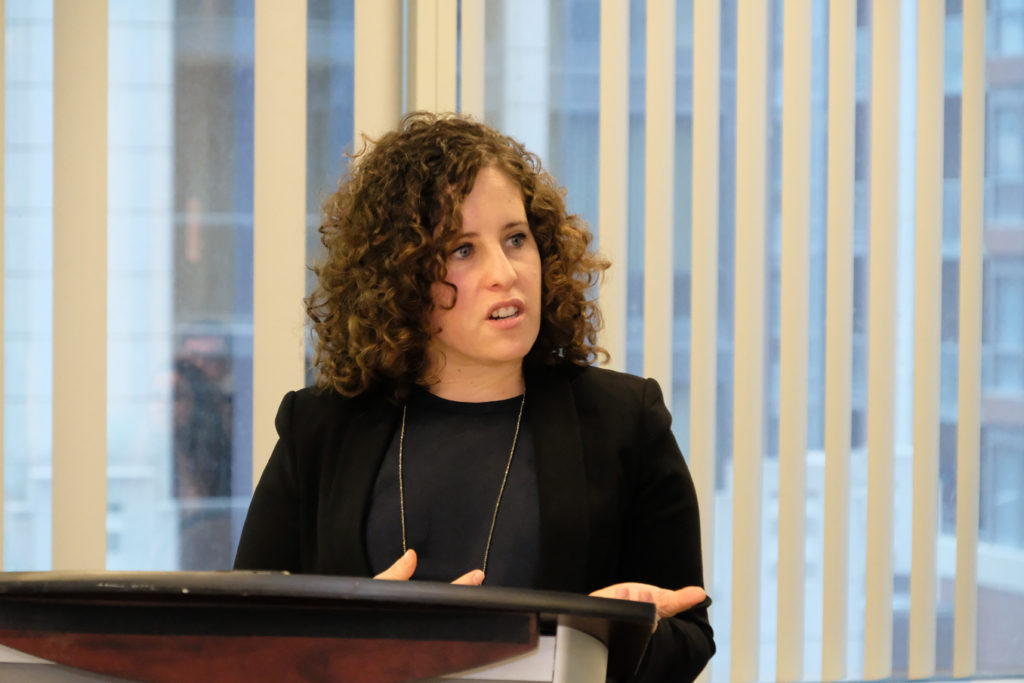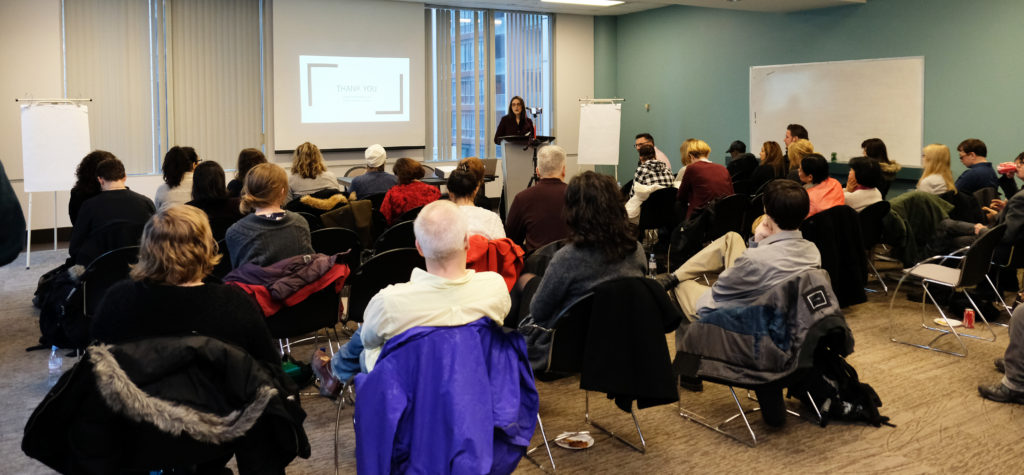Loving the Work Without Working Alone
by Alex Verman
Freelancers are often idealized as isolated entrepreneurs.
Working from anywhere at odd hours, freelancers are at liberty to pick our projects and dictate our schedules and build relationships and connections outside of the traditional office environment.
Nicole Cohen addresses this idea of the lone wolf writer head-on in her book, Writers’ Rights: Freelance Journalism in a Digital Age.
Cohen is former freelancer who now teaches at the Institute of Communication, Culture, Information, and Technology at the University of Toronto.
Last Saturday afternoon at the Metro Hall, Cohen led a discussion on the future of freelancing and freelancers’ place in a changing labour movement at a talk organized by the Canadian Media Guild Freelance Branch and the Professional Writers Association of Canada (PWAC) Toronto chapter.
It’s true that there is a sort of autonomy and flexibility available through freelancing that offers an attractive alternative to established capitalist models. But Cohen argues that autonomy doesn’t mean solitude. In fact, working alone can work against us.
The power imbalance between writers and publications makes it dangerously easy for editors to abuse freelancers. There’s no shortage of bad contracts, ridiculous deadlines, and demands on every kind of rights to our work in exchange for a single one-time payment.
Going Beyond Precarious Labour
Cohen launched into the talk by laying out the research behind Writer’s Rights, and the context for our discussion as a time of “media ubiquity.” According to Cohen, there’s never been a better time for freelancers to work together.
The amount of content that media outlets are producing is practically unprecedented — playing to digital audiences means high volume at high turnover. So it makes sense that freelance labour has become a mainstay of the digital media landscape, and it’s likely that freelancers and our work will be even more necessary in the near future.
At the same time, media workers in general (and writers in particular), are also facing startling insecurity. The landscape for freelancers is one of expansion, for sure, but not one of sustainability. Canadian media companies are making historic cuts, layoffs, and changes to their staff. Publications are relying more heavily on work done by non-employees.
And that means they’re also offloading the risks associated with media work onto freelance writers, without providing any of the support that journalists used to be able to rely on. She argues that these dynamics are linked to the highly individualized labour space where writers live and work; the landscape is ripe for exploitation.
Cohen was blunt: “Despite this love of the work, it’s become increasingly clear that freelancers face declining material conditions.” As great as it is to work independently, the majority of freelancers are in a vulnerable position in the digital media world. It’s a game of high risk and low reward on incredibly unequal footing, and that means most freelance writers are in a perpetually precarious position.
Changing Perspectives on Collective Organizing
Cohen’s survey of freelancers and their activism showed some clear steps forward. When it comes to improving the material conditions of precarious workers, she says, the answer is almost always to work together.
That’s especially true for freelance writers, where collective organizing has been most effective in changing bad contracts, improving fee structures, and pressuring publications to pay their freelance writers on time. During the Q&A session, most of the discussion focused on how to make more collective changes happen.
The tone was frank but optimistic. Two of the strongest voices were Karen Lutrell and Katherine Lapointe. Lutrell is the chapter president of PWAC. Lapointe is the digital media organizer with CWA Canada, the Canadian branch of the Communications Workers of America, parent union of CMG Freelance.
According to Lapointe and Lutrell, mobilizing as a community requires changing our perspectives on how we work. “I want to emphasize how important it is that we not work in isolation, that we work together,” said Lutrell. One example of this kind of cooperation is that her organization, PWAC, partners with CMG Freelance to offer health benefits for active members.
Similarly, Lapointe described how CWA Canada introduced an associate membership program to offset some of the risks facing newcomers to journalism and marginalized writers. By encouraging union participation and training, the program creates more accessible pathways to a career in journalism.
Back in the late 1970s, the Canadian government commissioned a study of freelance writers. In 1982, the author of the study, Brian Harrison, quipped that, “A freelance writer is someone who has a typewriter and a working mate.”
It is tremendously difficult to make it on your own while working on your own. But as Cohen and her colleagues argued, there’s a lot to be said in favour of relying on each other. Solutions to the problems freelancers face are within reach. It’s just a matter of organizing as a collective to make them a reality.
Alex Verman is a writer and researcher from Toronto who focuses on community and identity politics. They have worked as a content strategist, organizer, and marketing writer. You can connect with them on Twitter @misgenders.





